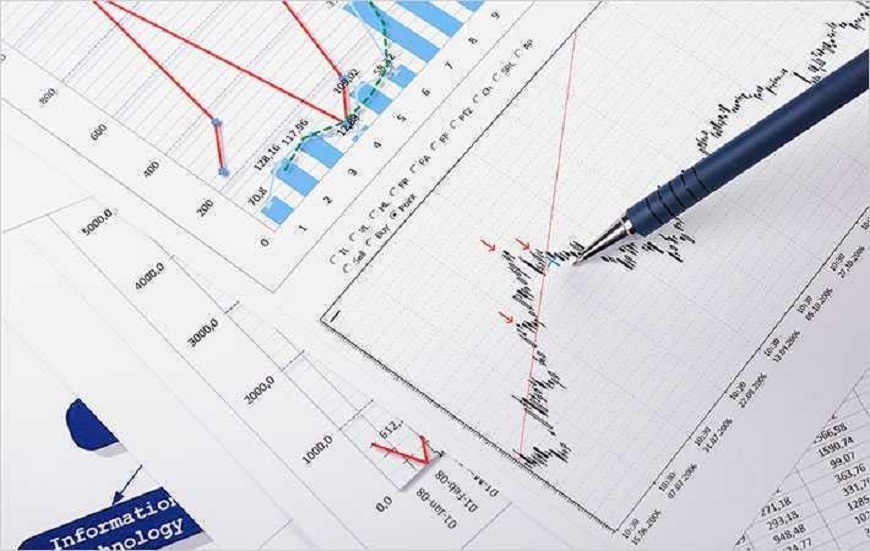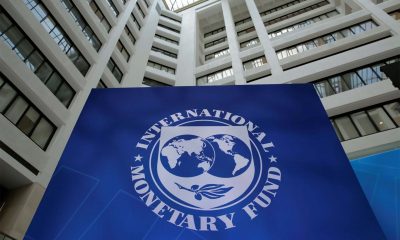Economy
S&P Cuts Nigeria’s 2020 GDP Growth Forecast to 1.5%

By Dipo Olowookere
The Gross Domestic Product (GDP) growth forecast for Nigeria in 2020 has been revised downward to 1.5 percent from 2.2 percent by Standard and Poors (S&P).
In a press statement issued on Thursday, the rating agency also announced lowering its long-term foreign and local currency sovereign credit ratings on Nigeria to ‘B-’ from ‘B’.
In addition, the renowned company said it has affirmed its ‘B’ short-term sovereign credit ratings on Nigeria, while downgrading its long-term Nigeria national scale rating to ‘ngBBB’ from ‘ngA-’ and affirming the ‘ngA-2’ short-term Nigeria national scale rating.
S&P explained that the economic growth projection was reduced to 1.5 percent “since the effects of lower oil revenue will filter through to the non-oil real sector” of the country.
“We forecast real GDP will expand by a modest 2 percent over 2020-2023.
“In per capita terms, this translates into economic contraction over our forecast horizon through 2023. Nigeria’s per capita GDP remains below that of several peers, with income levels below $2,000 in 2020,” it said in the statement.
Early this month, the Organisation for the Oil Producing Exporting Countries (OPEC) failed to agree to a proposed reduction of 1.5 million barrels per day (mmbbl/d) to address an expected significant drop in global demand partly due to the spread of the coronavirus.
Shortly after the meetings, Saudi Arabia announced that it was immediately slashing its official selling price and would increase its production to over 12 mmbbl/d in April after the current production cut expires next Tuesday.
These actions possibly signal that, despite a collapse in global demand and shrinking physical markets, Russia and Saudi Arabia may engage in a price war to try and maintain market share and market relevance.
Oil markets are now heading into a period of severe supply-demand imbalance in second-quarter 2020.
Given that Nigeria’s reliance on oil revenue is still high, over 85 percent of goods exports and about half of fiscal revenues, lower oil prices in 2020 will significantly hurt its external and fiscal positions, S&P said.
“We estimate the economy will grow about 1.5 percent in 2020 (our previous estimate was 2.2 percent) and average 2.0 percent in 2020-2023.
“Our forecast for a sharp decline in oil prices, and consequent lower export revenues, are likely to result in the current account deficit increasing to 3.3 percent of GDP this year before moderating over the medium term and averaging -1.1 percent in 2020-2023,” the agency said.
S&P had said in February 2020 that the Brent oil prices were expected to average $60 per barrel (/bbl) in 2020 and to gradually decline to $55/bbl from 2021.
However, based on recent development, it has now projected price of the Brent oil at $30/bbl in 2020, $50/bbl in 2021, and $55/bbl from 2022.
In the 2020 budget, Nigeria pegged the crude oil benchmark at $57/bbl, but the COVID-19 pandemic forced a downward review recently to $30/bbl, with the size of the budget cut by N1.5 trillion from just over N10 trillion.
In its statement yesterday, S&P said on the fiscal side, lower oil-related revenue will keep general government in Nigeria (federal and state government combined) fiscal deficits elevated at about 5 percent of GDP this year, delaying planned gradual consolidation, before averaging 4.2 percent in 2020-2023.
The federal government has and will continue to make efforts to increase non-oil revenue, including the increase in value-added tax to 7.5 percent from 5.0 percent, reducing fuel subsidies, and raising electricity tariffs among other administrative measures, it said.
“In addition, adjustments to the exchange rate should also yield the federal government higher Naira revenues. Nevertheless, these measures are not expected to be enough to compensate for the forecast reduction in oil revenue. In addition, COVID-19-related spending is likely to affect expenditure,” the statement said.
Economy
Champion Breweries Concludes Bullet Brand Portfolio Acquisition

By Aduragbemi Omiyale
The acquisition of the Bullet brand portfolio from Sun Mark has been completed by Champion Breweries Plc, a statement from the company confirms.
This marks a transformative milestone in the organisation’s strategic expansion into a diversified, pan-African beverage platform.
With this development, Champion Breweries now owns the Bullet brand assets, trademarks, formulations, and commercial rights globally through an asset carve-out structure.
The assets are held in a newly incorporated entity in the Netherlands, in which Champion Breweries holds a majority interest, while Vinar N.V., the majority shareholder of Sun Mark, retains a minority stake.
Bullet products are currently distributed in 14 African markets, positioning Champion Breweries to scale beyond Nigeria in the high-growth ready-to-drink (RTD) alcoholic and energy drink segments.
This expansion significantly broadens the brewer’s addressable market and strengthens its revenue base with an established, profitable portfolio that already enjoys strong brand recognition and consumer loyalty across multiple markets.
“The successful completion of our public equity raises, together with the formal close of the Bullet acquisition, marks a defining moment for Champion Breweries.
“The support we received from both existing shareholders and new investors reflects strong confidence in our long-term strategy to build a diversified, high-growth beverage platform with pan-African scale.
“Our focus now is on disciplined execution, integration, and delivering sustained value across markets,” the chairman of Champion Breweries, Mr Imo-Abasi Jacob, stated.
Through this transaction, Champion Breweries is expected to achieve enhanced foreign exchange earnings, expanded distribution leverage across African markets, integrated supply chain efficiencies, portfolio diversification into high‑growth consumer beverage categories, and strengthened presence in the RTD and energy drink segments.
The acquisition accelerates Champion Breweries’ transition from a regional brewing business to a multi-category consumer platform with continental reach.
Bullet Black is Nigeria’s leading ready-to-drink alcoholic beverage, while Bullet Blue has built a strong presence in the energy drink category across several African markets.
Economy
M-KOPA Nigeria Plans Expansion to Edo, Others After N231bn Credit Milestone

By Adedapo Adesanya
Emerging market fintech firm, M-KOPA, has announced plans to deepen its reach in Nigeria to the South South and South East regions, starting with Edo this year, after providing N231 billion in credit to over 1 million customers in the country.
The firm released its first Nigeria-focused Impact Report, which showed that Nigeria is M-KOPA’s fastest-growing market and fastest to reach the milestone.
Since its foray into the Nigerian market in 2019, M-KOPA has been working to dismantle barriers to financial inclusion by providing flexible smartphone financing and digital financial tools that align with how people in the informal economy earn and manage their money.
It operates in six states in the country, including Lagos, Ogun, and Oyo, among others.
The report highlights the company’s contribution to income generation, digital inclusion and economic opportunity for Every Day Earners across the country.
The report showed that M-KOPA has enabled 290,000 first-time smartphone users, while 56 per cent of agents accessed their first income opportunity through the platform.
It showed high income and livelihood gains among its users, with about 77 per cent of customers leveraging smartphones or digital loans obtained through the platform to generate income, indicating that access to financed devices is directly supporting micro-entrepreneurial activity and informal sector productivity.
Furthermore, 75 per cent of users report higher earnings since gaining access to M-KOPA’s services, suggesting measurable improvements in personal revenue streams. On the distribution side, 99 per cent of agents disclose increased earnings, reflecting positive spillover effects across the company’s value chain.
In addition, 81 per cent of long-term customers state that their household expenses have improved, pointing to enhanced financial stability and better consumption smoothing over time.
Speaking on the report, Mr Babajide Duroshola, General Manager, M-KOPA Nigeria, said, “Nigeria represents extraordinary potential, and we’re proud that it has become M-KOPA’s fastest-growing market. Our Impact Report shows that when Every Day Earners gain access to the right digital and financial tools, they use them to create stability and long-term progress for their families. This is about access that unlocks opportunity and sustained prosperity.”
On its expansion plans Nigeria-wide, the M-KOPA helmsman said, “Many of the states we are considering are already similar to the ones we are currently in proximity… So, there is proximity and similarity between these states, and that’s what we are going to do, starting with Edo.”
He noted that as M-KOPA Nigeria continues to expand, the focus remains on ensuring more everyday earners gain access to the digital and financial tools they need to build resilient, prosperous futures in Nigeria’s rapidly digitising economy.
Economy
Tinubu Okays Extension of Ban on Raw Shea Nut Export by One Year

By Aduragbemi Omiyale
The ban on the export of raw shea nuts from Nigeria has been extended by one year by President Bola Tinubu.
A statement from the Special Adviser to the President on Information and Strategy, Mr Bayo Onanuga, on Wednesday disclosed that the ban is now till February 25, 2027.
It was emphasised that this decision underscores the administration’s commitment to advancing industrial development, strengthening domestic value addition, and supporting the objectives of the Renewed Hope Agenda.
The ban aims to deepen processing capacity within Nigeria, enhance livelihoods in shea-producing communities, and promote the growth of Nigerian exports anchored on value-added products, the statement noted.
To further these objectives, President Tinubu has authorised the two Ministers of the Federal Ministry of Industry, Trade and Investment, and the Presidential Food Security Coordination Unit (PFSCU), to coordinate the implementation of a unified, evidence-based national framework that aligns industrialisation, trade, and investment priorities across the shea nut value chain.
He also approved the adoption of an export framework established by the Nigerian Commodity Exchange (NCX) and the withdrawal of all waivers allowing the direct export of raw shea nuts.
The President directed that any excess supply of raw shea nuts should be exported exclusively through the NCX framework, in accordance with the approved guidelines.
Additionally, he directed the Federal Ministry of Finance to provide access to a dedicated NESS Support Window to enable the Federal Ministry of Industry, Trade and Investment to pilot a Livelihood Finance Mechanism to strengthen production and processing capacity.
Shea nuts, the oil-rich fruits from the shea tree common in the Savanna belt of Nigeria, are the raw material for shea butter, renowned for its moisturising, anti-inflammatory, and antioxidant properties. The extracted butter is a principal ingredient in cosmetics for skin and hair, as well as in edible cooking oil. The Federal Government encourages processing shea nuts into butter locally, as butter fetches between 10 and 20 times the price of the raw nuts.
The federal government said it remains committed to policies that promote inclusive growth, local manufacturing and position Nigeria as a competitive participant in global agricultural value chains.
-

 Feature/OPED6 years ago
Feature/OPED6 years agoDavos was Different this year
-
Travel/Tourism10 years ago
Lagos Seals Western Lodge Hotel In Ikorodu
-

 Showbiz3 years ago
Showbiz3 years agoEstranged Lover Releases Videos of Empress Njamah Bathing
-

 Banking8 years ago
Banking8 years agoSort Codes of GTBank Branches in Nigeria
-

 Economy3 years ago
Economy3 years agoSubsidy Removal: CNG at N130 Per Litre Cheaper Than Petrol—IPMAN
-

 Banking3 years ago
Banking3 years agoSort Codes of UBA Branches in Nigeria
-

 Banking3 years ago
Banking3 years agoFirst Bank Announces Planned Downtime
-

 Sports3 years ago
Sports3 years agoHighest Paid Nigerian Footballer – How Much Do Nigerian Footballers Earn
















